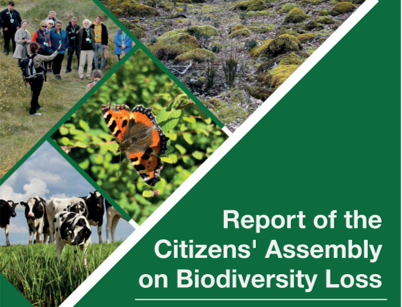
Date: 06 Apr 2023
Final Report of the Citizens’ Assembly on Biodiversity Loss Launches
The Recommendations and Report of the Citizens’ Assembly on Biodiversity Loss was launched on Wednesday 5th April 2023. It contains over 150 recommendations that have the potential to dramatically transform Ireland’s relationship with the natural environment. The Citizens’ Assembly on biodiversity loss is the first to be staged anywhere in the world.
The report expresses the Assembly’s clear disappointment at the State’s failure to adequately fund, implement and enforce existing laws and policies, and concluded that the State “has comprehensively failed in relation to biodiversity”.
To address this, the 99 randomly selected members of the public, under chairwoman Dr Aoibhinn Ní Shúilleabháin agreed 159 recommendations, including 73 high-level recommendations and 86 sectoral specific actions and priorities.
Central to the report’s recommendations is the need for the State to take prompt, decisive, and urgent action to address biodiversity loss and restoration and to provide leadership in protecting Ireland’s biodiversity for future generations with fundamental changes to the funding, implementation and enforcement of national policies, EU biodiversity-related laws and relevant directives.
The report also proposes a series of changes to the Constitution to ensure people have a right to a clean, healthy, and safe environment. In addition, the Assembly recommends that nature be provided with protections within the constitution to allow it to continue to provide the necessities of life including food, clean freshwater and air, as well as providing a clean and healthy environment for wellbeing now and in the future. Such recommendations follow a growing international trend highlighting the necessity to protect nature in order to protect humans.
Other recommendations in the report refer to actions in specific sectors such as agriculture; freshwaters; marine and coastal environments; peatlands; forestry/woodlands/hedgerows; protected sites and species; invasive species; and urban and built environments. There is a specific acknowledgement of the role of farmers as the custodians of the land possessing a rich knowledge and understanding of the environment, and that the agriculture industry must be supported in conserving and restoring biodiversity.
Commenting on the final report Dr Aoibhinn Ní Shúilleabháin, said that it is now incumbent on members of the Oireachtas to study the report, consider its recommendations, and act upon them. She emphasised the need for urgency given the scale of the crisis that confronts us.
“This report has been put together through the efforts of all members and the wide range of views and perspectives that we were fortunate to listen to, debate, and discuss over the course of the Assembly’s meetings. I want to thank all members who attended the Assembly, and all those who spoke at our meetings or made submissions. Those efforts are reflected in this final report. The Assembly’s recommendations are a call to action. They ask us all to re-evaluate our current practices across the whole of society and in industry, agriculture, social enterprise, local government, national agencies and government departments. Future generations are depending on us to act now. Some sectoral interests and lobby groups may resist attempts to address biodiversity loss, but it is urgent that our policy makers, in particular our politicians, are supported in making bold decisions to protect, conserve and restore the natural environment in the interest of all of the people, present and future, of the island of Ireland. The reassuring greens of our landscape mask the loss we are experiencing of so many key elements of our natural environment. The figures that the Assembly heard are stark. And the problems are getting worse. Things must change.”